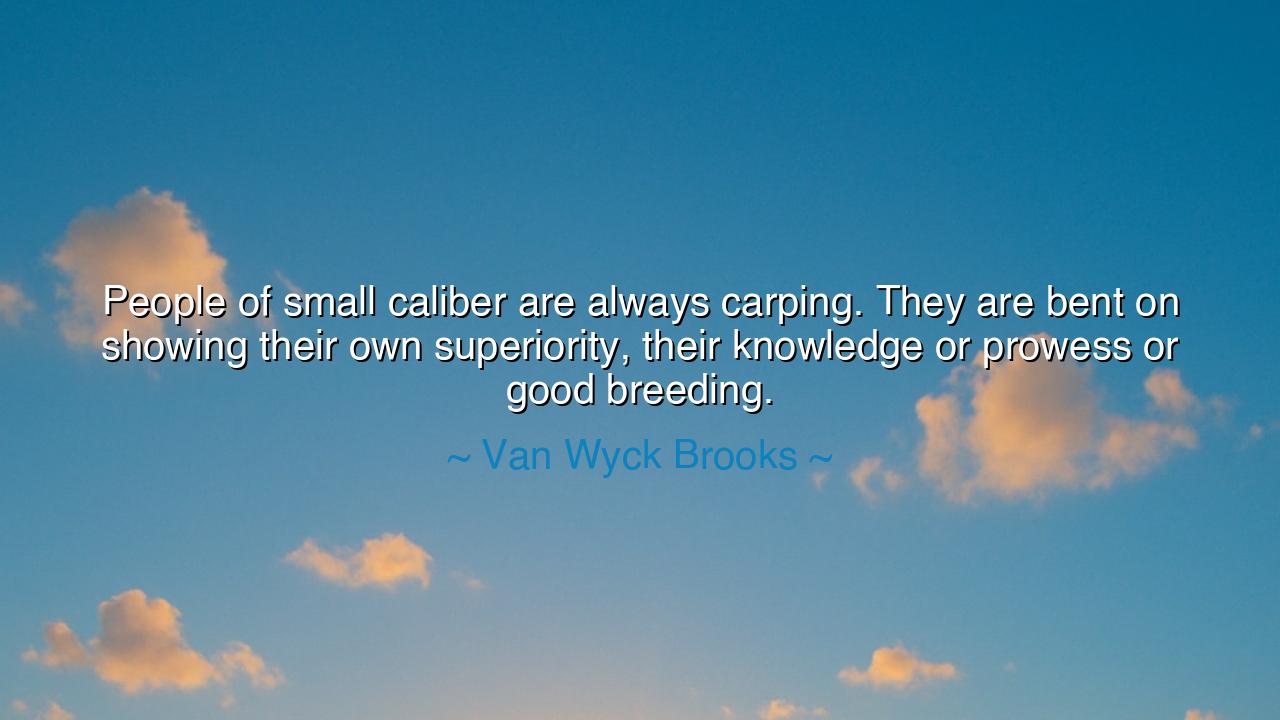
People of small caliber are always carping. They are bent on
People of small caliber are always carping. They are bent on showing their own superiority, their knowledge or prowess or good breeding.






Hear the words of Van Wyck Brooks, a critic and historian of letters, who spoke with piercing clarity: “People of small caliber are always carping. They are bent on showing their own superiority, their knowledge or prowess or good breeding.” In this saying, he uncovers the nature of pettiness, that restless spirit which feeds not on greatness, but on the constant need to belittle others. He shows us that the truly weak often seek to appear strong by tearing down what they cannot build, by magnifying trifles and parading false superiority.
The ancients, too, recognized this truth. In the agora of Athens, Socrates faced men who pretended to wisdom, challenging him with endless quibbles, seeking not truth but victory. These were the small caliber souls of his time, whose weapons were carping criticisms, not genuine inquiry. Yet Socrates, calm and steady, revealed their emptiness by his humility, saying, “I know that I know nothing.” Thus Brooks’ words carry an echo of ancient philosophy: that greatness lies not in the display of superiority, but in the quiet pursuit of wisdom.
History also gives us striking examples. Consider the tale of Michelangelo, who, while painting the Sistine Chapel, endured the jealousy of lesser men. Some mocked his methods, others whispered doubts, hoping to undermine him. These carping voices did not create, they only criticized. Yet when the ceiling was revealed, filled with images of majesty and creation, their pettiness was forgotten, while his genius endured for centuries. Here we see Brooks’ truth: the small caliber strive to seem important by criticizing, but true greatness speaks for itself, beyond all petty reproach.
Brooks also exposes the motive of such behavior: the hunger to show superiority, whether through claims of knowledge, boasts of prowess, or airs of noble birth. But this false superiority is like smoke in the wind—seen for a moment, then dispersed. True superiority does not need to announce itself. The wise man does not declare his wisdom, the noble does not proclaim his nobility, the strong do not boast of their strength. Their actions, their character, their legacy speak louder than their tongues.
What then is the danger of being surrounded by the carping spirit? It breeds doubt, sows envy, and distracts from creation. It corrodes communities, for when small minds dominate, they drown out vision and stifle innovation. Nations, too, have fallen when governed by such spirits—leaders who cared more for appearances than for truth, more for seeming superior than for building greatness. The Roman Empire, in its decline, became filled with such posturing, where senators sought honor in words and lineage, while the substance of their republic rotted.
The lesson for us, O seeker, is clear: beware of the small caliber spirit within yourself, and guard against it in others. Do not waste your strength on endless criticism meant only to exalt your own image. Instead, turn your energy to building, to creating, to serving. Praise what is noble, uplift what is good, and strive for true mastery rather than empty appearances. In this way, your character will shine brighter than the loudest critic’s words.
Therefore, let Van Wyck Brooks’ words be a reminder: carping is the weapon of the small, while humility, service, and creation are the marks of the great. Do not be seduced by the temptation to prove superiority through petty words. Instead, live so fully, work so diligently, and love so deeply that your life itself becomes your answer. For the greatness of spirit needs no trumpet, and its memory endures long after the voices of the carping have faded into silence.






AAdministratorAdministrator
Welcome, honored guests. Please leave a comment, we will respond soon